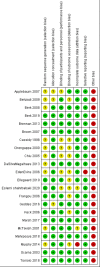A Systematic Review of Nutraceuticals for the Treatment of Bipolar Disorder
- PMID: 32966097
- PMCID: PMC7958203
- DOI: 10.1177/0706743720961734
A Systematic Review of Nutraceuticals for the Treatment of Bipolar Disorder
Abstract
Background: Certain nutrient supplements (nutraceuticals) may target neurobiological pathways perturbed in bipolar disorder (BD) such as inflammation, oxidative stress, and mitochondrial dysfunction. Nutraceuticals thus may have a potential role as adjunctive treatments for BD.
Methods: A search of Embase via embase.com, PubMed via PubMed, Cumulated index to nursing and allied health literature (CINAHL) Complete via EBSCO, and Cochrane Central Register of Controlled Clinical Trials via cochranelibrary.com was conducted to identify published randomized controlled trials assessing the efficacy of nutraceuticals on mood symptomatology in adults with BD. Search terms for BD, nutraceuticals, and clinical trials (total search terms = 75) were used to search from inception to February 20, 2020. The Cochrane Collaboration's tool for assessing the risk of bias in randomized trials was used to assess the risk of bias.
Results: A total of 1,712 studies were identified through the search. After rigorous screening, 22 studies were included in the review. There was large variability across the studies with 15 different nutraceutical agents assessed and as such insufficient homogeneity for a meta-analysis to be conducted (I2 > 50%). Studies revealed promising, albeit conflicting, evidence for omega-3 fatty acids and N-acetylcysteine. Isolated positive results were reported for coenzyme Q10.
Conclusion: Given nutraceuticals are tolerable and accessible, they may be useful as potential adjunctive treatments for BD. Nutraceuticals targeting neuroinflammation or mitochondrial activity may have the most potential for the depressive phase. However, further studies are required to determine efficacy.
Contexte:: Certains suppléments diététiques (les nutraceutiques) peuvent cibler des circuits neurobiologiques perturbés dans le trouble bipolaire comme l’inflammation, le stress oxydant et la dysfonction mitochondriale. Les nutraceutiques peuvent donc avoir un rôle potentiel comme traitements d’appoint du trouble bipolaire.
Méthodes:: Une recherche d’Embase a été menée dans embase.com, PubMed dans PubMed, CINAHL complète par EBSCO, et le registre Cochrane central des essais contrôlés par cochranelibrary.com, afin d’identifier les essais cliniques randomisés contrôlés publiés évaluant l’efficacité des nutraceutiques pour la symptomatologie de l’humeur chez les adultes souffrant du trouble bipolaire. Les termes de recherche du trouble bipolaire, nutraceutiques et essais cliniques (total des termes de recherche = 75) servaient à chercher du début jusqu’au 20 février 2020. L’outil de collaboration Cochrane qui évalue le risque de biais dans les essais randomisés a servi à évaluer le risque de biais.
Résultats:: La recherche a produit un total de 1 712 études. Après un dépistage rigoureux, 22 études ont été incluses dans la revue. Il y avait une importante variabilité entre les études et 15 différents agents nutraceutiques ont été évalués et à ce titre, l’homogénéité était insuffisante pour mener une méta-analyse (I2 > 50%). Les études ont révélé des données probantes prometteuses, quoique conflictuelles, pour les acides gras omega-3 et la N-acétylcystéine. Des résultats positifs isolés ont été rapportés pour le coenzyme Q10.
Conclusion:: Étant donné que les nutraceutiques sont tolérables et accessibles, ils peuvent être utiles à titre de traitement d’appoint potentiel du trouble bipolaire. Les nutraceutiques qui ciblent la neuro-inflammation ou l’activité mitochondriale peuvent avoir le plus de potentiel pour la phase dépressive. Toutefois, il faut d’autres études pour en déterminer l’efficacité.
Keywords: bipolar disorder; depression; dietary supplement; mania; mental health; neuroscience; nutraceuticals; psychiatry.
Conflict of interest statement
Figures
References
-
- Malhi GS, Bassett D, Boyce P, et al. Royal Australian and New Zealand College of Psychiatrists clinical practice guidelines for mood disorders. Aust N Z J Psychiatry. 2015;49(12):1087–1206. - PubMed
-
- Sarris J, Murphy J, Mischoulon D, et al. Adjunctive nutraceuticals for depression: a systematic review and meta-analyses. Am J Psychiatry. 2016;173(6):575–587. - PubMed
-
- DeFelice SL. The nutraceutical revolution: its impact on food industry r & d. Trends Food Sci Technol. 1995;6(2):59–61.
-
- Sarris J, Mischoulon D, Schweitzer I. Adjunctive nutraceuticals with standard pharmacotherapies in bipolar disorder: a systematic review of clinical trials. Bipolar Disord. 2011;13(5-6):454–465. - PubMed
Publication types
MeSH terms
LinkOut - more resources
Full Text Sources
Medical



